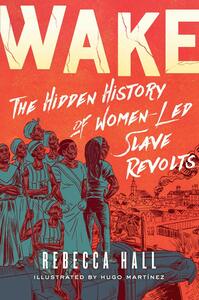Take a photo of a barcode or cover
emotional
informative
fast-paced
The format of this was interesting, and I was very interested in the subject matter. In practice, though, this book is less about the subject of female-led slave revolts and more about the process of searching the historical record FOR evidence of female led slave revolts. Because the historical record is lacking, there’s a lot of holes that the author has to fill with conjecture based on what isn’t said. It was understandable, given the difficulty of the task, but not very satisfying.
Wake: The Hidden History of Women-Led Slave Revolts is a graphic novel that details Dr. Rebecca Hall’s journey to uncover the truth about women-led slave revolts. Dr. Hall searched through court records and other documents to learn more information about this topic.
The choice to make this a graphic novel is one of the aspects I really enjoyed about reading this piece. I also enjoyed reading about the journey Dr. Hall went on to dive into this topic in pursuit of her PhD.
With that being said, my main critique of this piece is that I expected to learn more about women-led slave revolts. However, it mostly just documented the journey to uncover the truth…and not a lot was uncovered, at least not in this piece. However, that is to no fault of Dr. Hall. As she details, it was and is difficult to get access to certain records, like from insurance companies that built their wealth providing insurance to slavers to cover any potential loss of “property.”
I would still recommend this read because it was an easy one but also because it made me think about a topic that I never considered before.
The choice to make this a graphic novel is one of the aspects I really enjoyed about reading this piece. I also enjoyed reading about the journey Dr. Hall went on to dive into this topic in pursuit of her PhD.
With that being said, my main critique of this piece is that I expected to learn more about women-led slave revolts. However, it mostly just documented the journey to uncover the truth…and not a lot was uncovered, at least not in this piece. However, that is to no fault of Dr. Hall. As she details, it was and is difficult to get access to certain records, like from insurance companies that built their wealth providing insurance to slavers to cover any potential loss of “property.”
I would still recommend this read because it was an easy one but also because it made me think about a topic that I never considered before.
emotional
informative
fast-paced
dark
emotional
hopeful
informative
fast-paced
I like the idea of using informed imagination to fill gaps in unrecorded history especially where racist and sexist attitudes means the histories of vulnerable peoples are not recorded and therefore untold.
Graphic: Racism, Rape
challenging
dark
emotional
informative
reflective
sad
fast-paced
adventurous
informative
inspiring
reflective
fast-paced
If you are interested in history and archival silencing/bias you need to read this book. It needs to be read. It needs to be taught, read and remembered.
challenging
dark
emotional
inspiring
sad
fast-paced
3.5/5
This is a well-researched and told story, but I'm not convinced that a graphic novel was the best format to convey the information. Dr. Rebecca Hall seems like an incredible scholar and person, and I'd love to read more of her work, but I think this story may have been more effective if it were a slightly deeper dive into both her memoir aspects and the research she is doing into the women-led slave revolts. Perhaps a nonfiction narrative that follows her to important sites and archives as she tries to piece this together (this is fresh in my mind, having just listened to Clint Smith's How the Word is Passed, which used this format to great effect). I did also come in with the expectation that the book was going to cover documented revolts that may not have gotten their due in historical conversations (an overview of sorts, in the vein of Amazons, Abolitionists, and Activists), and while I was quite interested in how deep Dr. Hall had to go to even find documentation of women at all, that history didn't feel totally balanced with her present-day story, and the recreation that has to happen, while not entirely surprising given the available resources, didn't necessarily provide the narrative I was expecting.
While the historical/research aspects of this book did benefit to a certain degree from being illustrated, I wasn't sure that this was a story that HAD to be told in graphic format. It brings an accessibility to it, for sure, but the book was very text/caption-heavy, which to me meant that the illustration wasn't sharing equal weight in the telling of the story. I wasn't a fan of the art/illustrations, but that may just my personal preference. I find this sketchy style harder for my eyes to follow, though I do think it was an effective choice given the subject matter.
It is a fairly quick (though intense) read, so I'd still recommend it for readers looking for an entry-point into stories about the massive global scale of the Atlantic slave trade, and some of the lesser-known stories or impacts of that trade on the lives of enslaved people and their future generations in America.
This is a well-researched and told story, but I'm not convinced that a graphic novel was the best format to convey the information. Dr. Rebecca Hall seems like an incredible scholar and person, and I'd love to read more of her work, but I think this story may have been more effective if it were a slightly deeper dive into both her memoir aspects and the research she is doing into the women-led slave revolts. Perhaps a nonfiction narrative that follows her to important sites and archives as she tries to piece this together (this is fresh in my mind, having just listened to Clint Smith's How the Word is Passed, which used this format to great effect). I did also come in with the expectation that the book was going to cover documented revolts that may not have gotten their due in historical conversations (an overview of sorts, in the vein of Amazons, Abolitionists, and Activists), and while I was quite interested in how deep Dr. Hall had to go to even find documentation of women at all, that history didn't feel totally balanced with her present-day story, and the recreation that has to happen, while not entirely surprising given the available resources, didn't necessarily provide the narrative I was expecting.
While the historical/research aspects of this book did benefit to a certain degree from being illustrated, I wasn't sure that this was a story that HAD to be told in graphic format. It brings an accessibility to it, for sure, but the book was very text/caption-heavy, which to me meant that the illustration wasn't sharing equal weight in the telling of the story. I wasn't a fan of the art/illustrations, but that may just my personal preference. I find this sketchy style harder for my eyes to follow, though I do think it was an effective choice given the subject matter.
It is a fairly quick (though intense) read, so I'd still recommend it for readers looking for an entry-point into stories about the massive global scale of the Atlantic slave trade, and some of the lesser-known stories or impacts of that trade on the lives of enslaved people and their future generations in America.




